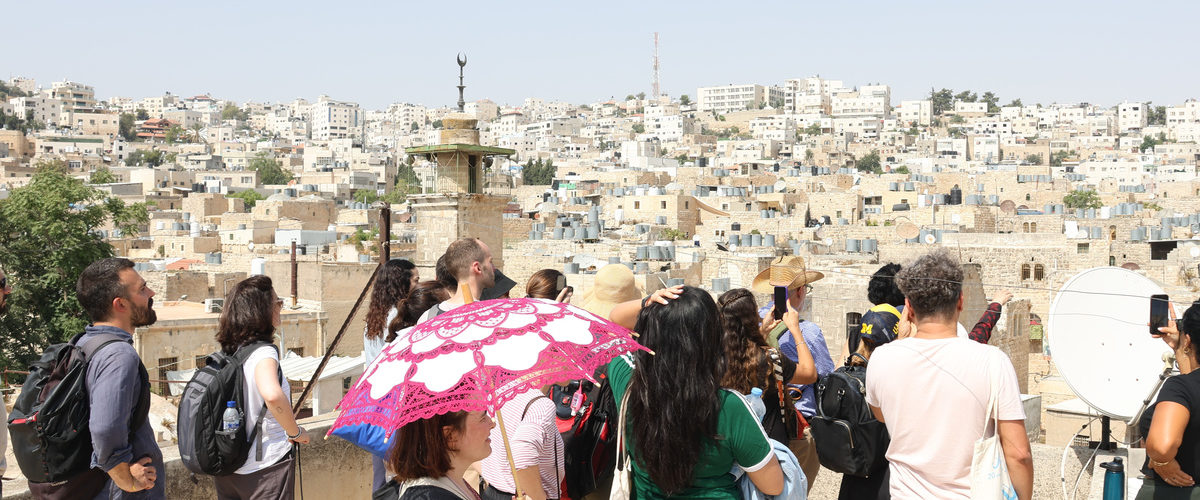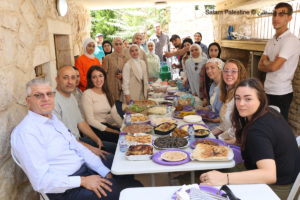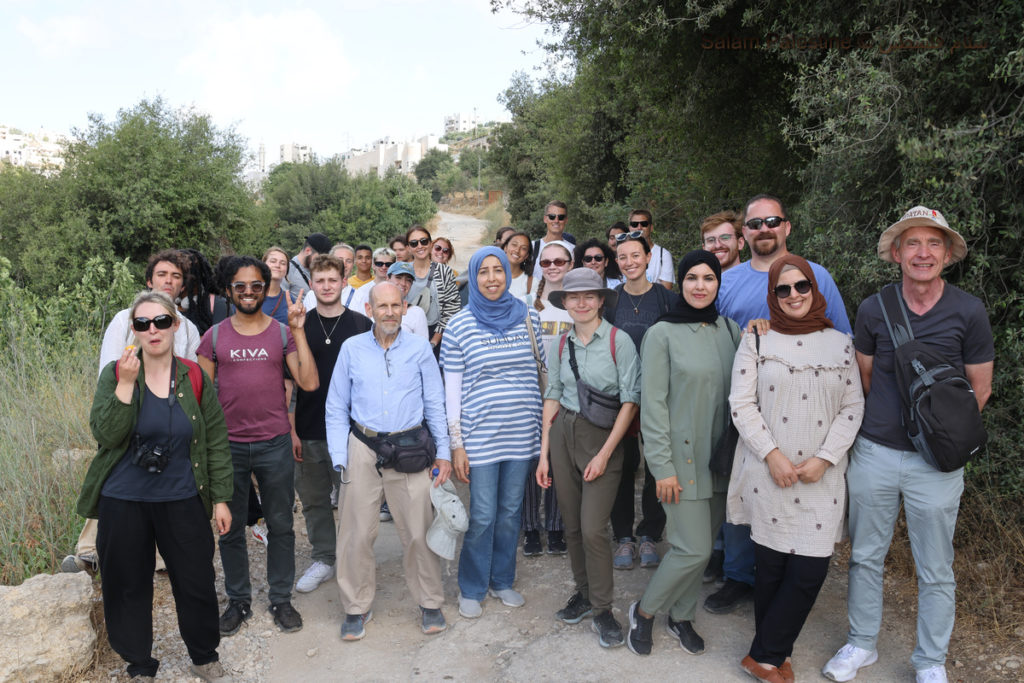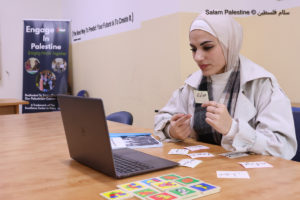Traveling Alone In The West Bank: The prospect of solo travel to Palestine can be a daunting prospect for many potential visitors. The thought of arranging a visa, and transport and encountering the notorious Israeli airport security and checkpoints can seem like insurmountable problems, but rest assured they are very manageable.
Navigating Palestine
Please be assured that whether you’re an experienced traveler or just starting, navigating Palestine is less nerve-wracking than one might think. Geographically, Palestine is a small country with very friendly and accommodating people. Visitors will never face the sort of daunting train trips or long bus rides one might find in Europe or the U.S.; those who find themselves lost or confused need only ask for assistance in finding their way.
Like many things in Palestine, for international visitors, traveling alone to and around the West Bank is not much more difficult than traveling around any other country. A variety of efficient transportation services can be found all around the West Bank, and the infamously rigorous security is often a breeze for internationals. Solo travelers may encounter some additional questioning at Ben Gurion airport but this is normal and no cause for concern.
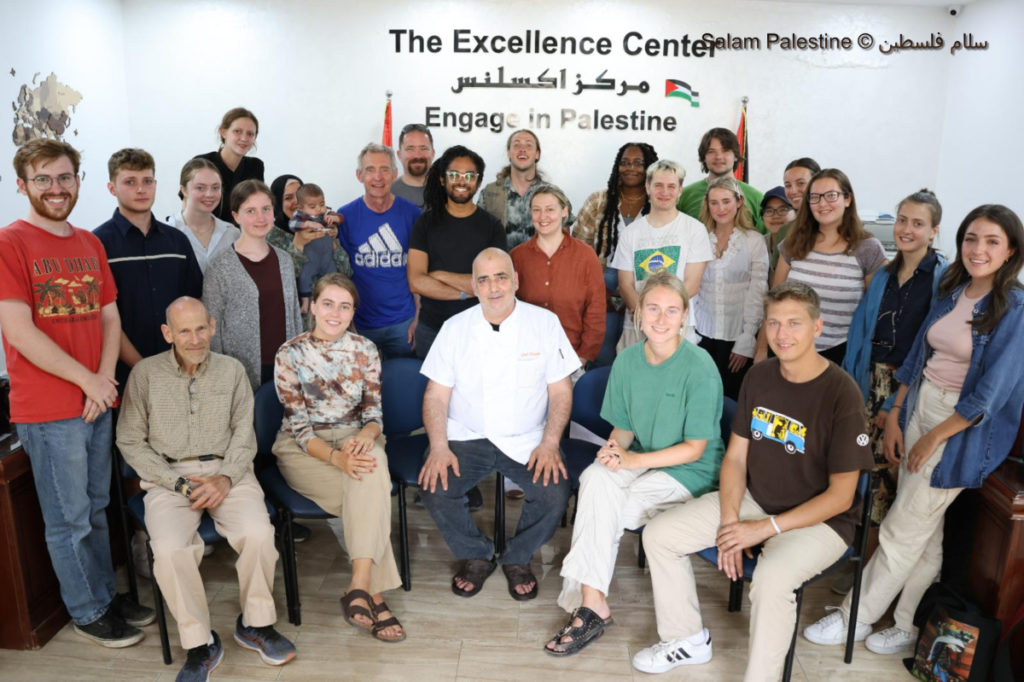
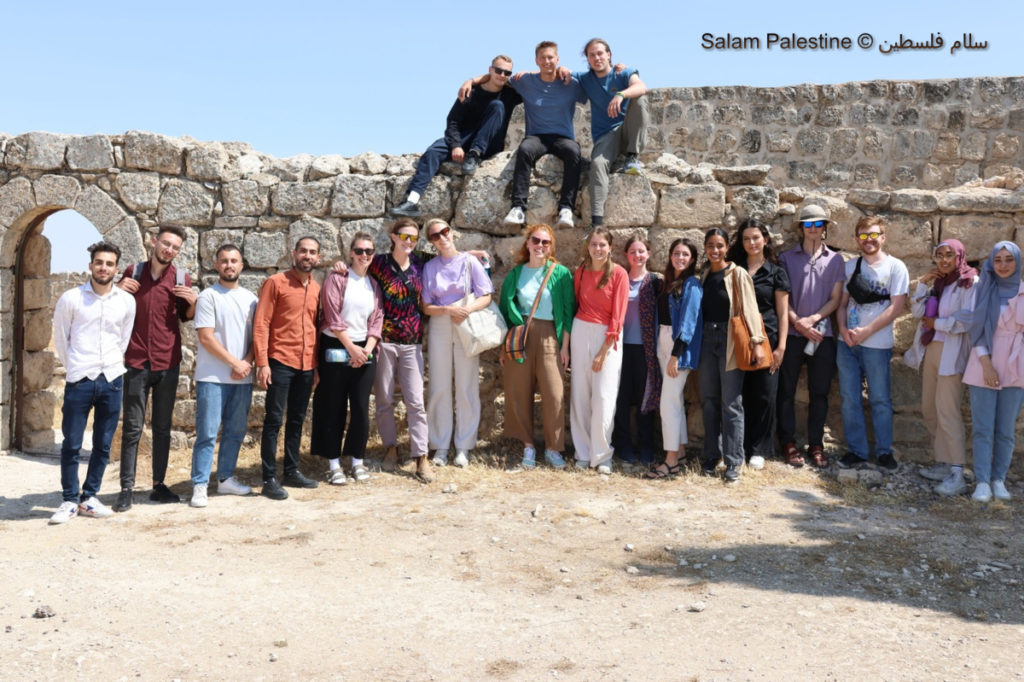
Salam Palestine Hosts Many International Participants
What is more, Salam Palestine hosts many international visitors from all over the world who will be studying, volunteering, visiting or interning during your stay. Hence, you will have the opportunity to engage with them in some of the educational and community activities organized by us.
Everyone at Salam Palestine – Palestinian students, international visitors, and staff alike – is one big family and there are always activities on offer that bring the family together. In addition, Hebron is a good place for international visitors to stay and offers a memorable social environment.
This article aims to discuss the practicalities of traveling alone in the West Bank and explain the best and easiest ways of doing so. Many of the international visitors to Salam Palestine travel alone with no issues.
The West Bank Is Not The Same As Gaza
The notion of traveling alone to Palestine might be intimidating for would-be travelers. Many nations issue travel advisories about Palestine, but the majority of them concentrate on Gaza, which is, in reality, a location to avoid. Gaza has been under Israeli blockade and siege for several years, so even if you wanted to take a trip to Gaza, Israeli authorities would not allow you in. The West Bank, on the other hand, is a low-risk destination.
Every year, pilgrims and tourists, even those traveling alone, visit Palestine. A range of fast transportation options are available across the West Bank, and the notoriously stringent security is typically a breeze for internationals. Below, we will share some useful information that you might find helpful:
1) Moving Around
Shared vs. Private Taxis
The West Bank is mostly serviced by a network of local and commercial taxi services. These bright yellow taxis can often be seen darting around the narrow streets of Hebron and flying down the highways towards Jerusalem. Generally speaking, taxi services are divided between private and shared taxis.
Smaller Taxis
The smaller taxis (what most people would consider a regular-sized taxi) most commonly seen in cities of the West Bank may be available for both private and shared trips, the former option of course being more expensive. This style of taxi is best suited for local trips within Hebron or Bethlehem and should only cost a few shekels. If you have the phone number of a taxi driver, you can call them. Alternatively, you can hail one on the street and there are sometimes places where taxis wait.
If you wish to share a small taxi within a city, it is best to hail one that already has a passenger in it, and if you are going in the same direction, the driver will tell you to hop in.
Many Drivers Know A Little English
The majority of the drivers know a little English, just enough to get you to your destination and to strike up a discussion. Palestinian taxi drivers are often eager to talk to tourists. For many years, international visitors to the West Bank were rare. Most Palestinian taxi drivers (and most Palestinians in general) are pleased to welcome foreign visitors. They will relish the opportunity to speak about Palestine and also perhaps ask questions about the visitor’s home country.
Smaller Taxis Are Expensive For Long Journeys
While these smaller taxis may cover inter-city and inter-town routes, they are not necessarily the best or cheapest choice for longer travel. Long journeys (by Palestinian standards, such as Jerusalem to Hebron) may be expensive. A pleasant taxi driver may gladly transport you alone for a little higher rate, or with several locals for a tiny decrease but the bigger shared cabs are the most cost-effective alternative.
Shared Taxis
Shared taxis are larger than their smaller, private counterparts, and can be found all around Palestine with almost as much frequency, however they are especially prominent at high-traffic crossing points such as Jerusalem and Jericho. Shared taxis are about the same size as the typical mini-van and can be found outside high-traffic areas, popular tourist attractions, and bus stations.
Their drivers may be heard calling out the place names al-Khaleel (Hebron), al-Quds (Jerusalem), and Bethlehem. The price of a shared taxi is usually around 10-50 shekels per person depending on the route. Simply get into the designated taxi, find a seat, and then wait for it to fill up. The cab will leave once there are enough passengers. Payment for the ride can be made at any time during the journey and passengers will pass their cash forward to the driver. It’s usually a good idea to make your payment when you see other passengers doing the same.
Travel Between Cities Throughout The West Bank
In addition to the network of taxis, transport by bus is also commonly utilized to travel between cities throughout Palestine. While a bus will not always cover the entire distance to the next city, they are competitively priced, making it an economical alternative for the frugal traveler. Depending on your departure point, buses may be listed in Arabic, Hebrew, or English, especially when traveling from Jerusalem or other popular tourist centers.
There is no direct bus route from Jerusalem to Hebron, the nearest bus destination being Bethlehem; between Bethlehem and Hebron, a shared taxi will be the next mode of transport. The same also applies to those using the King Hussein/Allenby Bridge Crossing from Jordan; once past Israeli border control, a bus to Jericho will be available, and from Jericho, a mass of shared taxis will be in high supply.
Note
Google Maps does not work properly in Palestine; as a lone traveler, you will require a map of West Bank cities. The application “maps.me” provides a dependable alternative with precise city mapping. This program is popular among travelers since maps can be downloaded and used offline without the need for internet access.
2) Have Some Street Smarts
Having street smarts is always a good idea while traveling, no matter where you go. Using common sense to select what to do, where to go, who to catch a ride from, etc. is essential for whichever location you visit. A careless attitude might get you into hot water, but as long as you are vigilant, sensible, and aware of your surroundings, you will be fine.
3) Going Shopping In The Market
This is one example of where international visitors are likely to notice a difference in culture. Haggling is customary while purchasing in the marketplace. The majority of Westerners are accustomed to seeing fixed pricing at stores. However, in the Middle East, you should anticipate bartering. Do not be afraid to haggle with the store owner or taxi driver, whether you are buying at the market or taking a cab to your destination.
Often, the first price quoted is high and not the amount that the vendor expects the buyer to pay. By the same token, the first sum offered by the buyer is usually lower than the final price that the seller expects to achieve. Bartering is a typical interaction. Please bear in mind that dropping the price too low would be considered rude. You do not want to offend the individual with whom you’re bargaining by doing this so try to reach an agreement at a price that is acceptable to both parties.
4) Checkpoints And Dealing With Them
Israeli Checkpoints built and manned by Israel can be found all over Palestine, often outside settlements, Palestinian villages, Palestinian refugee camps, and roads with high traffic. For Palestinians, these checkpoints impede any sort of development and autonomy as they heavily restrict their movements.
Checkpoints Are Easy To Navigate For Internationals
Although these checkpoints severely limit the freedom of movement of the Palestinian people, they are simple to traverse for an international traveler. Internationals are often allowed to pass through without incident.
Our Advice
The security personnel stationed at the checkpoints are used to dealing with visitors. Internationals may be stopped and asked for their passport and visa. They may be questioned about why they are there, particularly if they are visiting Hebron, which is a less popular tourist site for most foreign visitors. However, as long as you are polite and use common sense, you will not have to deal with any further infringements.
Try not to be provocative or antagonistic. Actions such as taking photographs or being extremely outspoken will attract unwanted attention. The best advice for international visitors when dealing with checkpoints is to remain calm, be polite, and avoid complicating this process, do not volunteer information unless you are directly asked for it.
Make sure that you have the necessary documents available (passport and visa), provide simple, truthful answers to any questions and you will soon be sent on your way and permitted to explore Palestine!
5) Protests And Violence
The likelihood of encountering violence is currently relatively low. Incidents may take several forms, such as protests or stone-throwing but they seldom target or involve international travelers, whether solo or in a group. The reality is that the majority of “attacks” by Israelis are directed towards Palestinians in the West Bank, while the majority of “attacks” by Palestinians are directed at Israelis.
Traveling alone does not increase your chances of being a victim of one of these situations. In terms of your safety, like in any other country, common sense reigns supreme. It is advisable to avoid areas where it is known there are likely to be clashes. You will find that the locals are aware of flash-points and will be keen to help you to stay out of harm’s way.
Once again, it is important to refrain from saying or doing anything to increase any tension. Rather than becoming involved in any conflict, please remember that you can better serve the Palestinian cause by observing from a safe distance and reporting on these incidents later, raising awareness in your home country instead of raising tensions and violence levels in the West Bank.
6) Cultural Awareness
The culture of Palestine may seem alien yet living here reveals characteristics of humanity that transcend cultural differences. Regardless of how unlike two people seem to be, they will have more similarities than differences.
Much of the core of Palestine’s customs and conventions has been influenced by the prevalence of Islam and interaction with neighboring countries. Close government ties between and immigration among Lebanon, Jordan, Syria, and other countries of the Arab world have resulted in similar norms across this region. Palestinian culture in general is a rich array of contrasts from Western culture and is unique and impressive.
Palestinian People Are Incredibly Hospitable
Palestinian people are well known for being incredibly hospitable, and you might be invited to have tea or coffee with someone you have just met. Palestinians trust people very quickly and they enjoy meeting with internationals from all over the world and spending time with them.
Palestinians Take Care Of Their Guests
The Palestinian philosophy is to take care of their guests whoever they are and Palestinians will try to make their guests feel comfortable, treating them as if they have known them for a long time or as if they are part of the family. A Palestinian friend will invite you to go out with them often, check up on you regularly, and be your friend for a lifetime.
7) Interactions Between The Sexes
In terms of relationships between men and women, it is generally not customary for men to shake a woman’s hand unless she first offers her hand. When a lady travels to Palestine, she may expect to be greeted by other ladies with a handshake or a kiss on both cheeks.
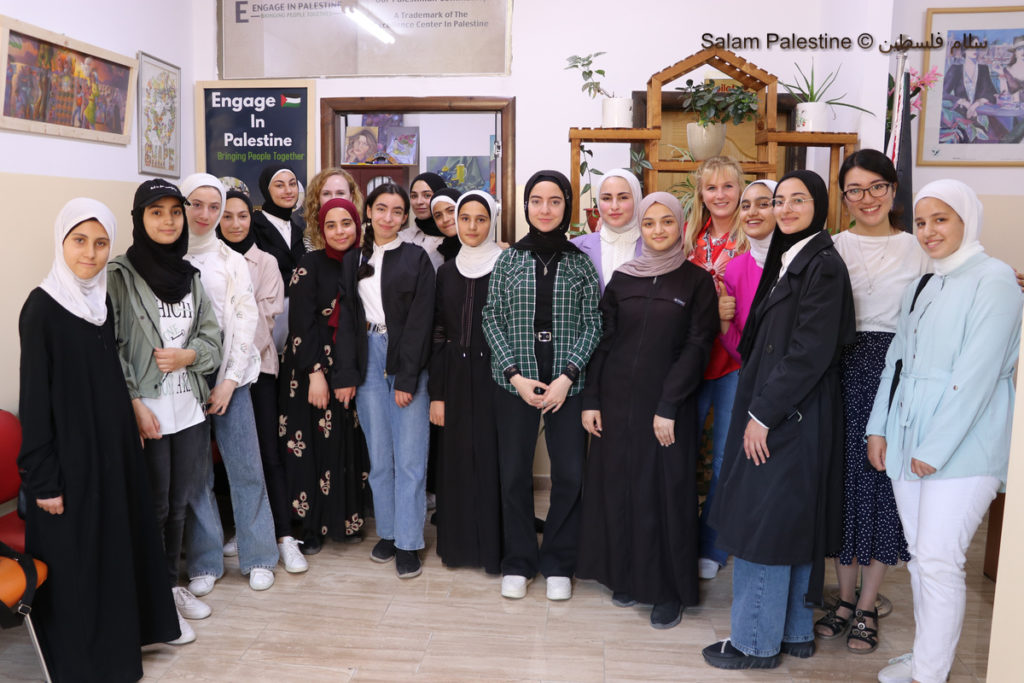
Women
Female tourists in particular should be mindful about their attire while visiting the Middle East. Women are not required to wear headscarves in Palestine, although they must wear shirts with sleeves and long slacks or skirts. Respect for the local culture is shown by dressing modestly. When traveling in areas with a majority Palestinian population, women should wear loose clothing, long sleeves, trousers, or a long skirt to avoid unwanted attention. If traveling to religious sites, women will be asked to wear a scarf over their shoulders and may occasionally be asked to cover their heads. This is done as a mark of respect and a sign of reverence to the surroundings.
When traveling in areas with a majority Palestinian population, women should wear long sleeves and trousers, or a long skirt to avoid unwanted attention.
Men
For men traveling in conservative areas such as Hebron long sleeves aren’t necessary except perhaps to protect against mosquitos. However, long trousers rather than shorts are recommended. Sandals for both men and women are generally acceptable, even in conservative religious areas and religious sites.
While foreigners are generally and warmly welcomed by residents, visitors must respect the local culture. Tight or revealing clothing will be counter to this aim.
8) Hospitality In Palestine
During your time here, you will be surrounded by people who want to help to make your trip to Palestine enjoyable. Palestinians are happy to invite you into their towns, stores, and even their homes. You might hear them saying “Hello” or “Welcome to Palestine” or “How are you?” They will be keen to help you to find what you are looking for. All these greetings act as a sign of hospitality and eagerness. We are always glad to have you here.
Palestinians Are Eager To Show Their Culture
Palestinians are eager to show the rest of the world their culture. They have not always had the opportunity to do so and are therefore keen to share knowledge and allow international visitors to experience their homeland. They will gladly engage visitors in many different family and cultural activities and celebrate Palestine. This will make your trip to Palestine full of amazing memories and enjoyable moments.
Locals not only wish to show you Palestinian culture but also they are equally very keen to learn of other peoples’ cultures, get to know about their daily habits and how they spend their time. It gives them a glimpse into another culture and way of life.
Palestinians want to make sure that you feel comfortable and welcome on their sacred land and among their people, no matter where you come from.
9) Culture of Congeniality
While passing through Israeli security measures is in itself a source of anxiety for many, traveling alone through a foreign country surrounded by an unfamiliar language can be equally daunting. During your time in Palestine, though, you are guaranteed to find friendly, helpful locals wherever you go.
You Will Surely Acclimate
Though it’s never immediate, you will surely acclimate and become familiar with your specific location, eventually establishing a routine as you sift through restaurants, markets, and cafes. Don’t hesitate to ask the locals around you as well, as Palestinians know all the best spots and are happy to assist foreigners with their suggestions.
Locals Are Friendly
Many Palestinians also know basic English and simultaneously appreciate foreigners who at least attempt to communicate in Arabic. It’s quite common for Palestinians to stop or call out to internationals in the street to welcome them. Travelers will more often than not find locals to be very friendly and talkative; you will never find yourself at a loss for conversation or assistance. Potential visitors should therefore rest assured that whether travelling in a group or by themselves, navigating through Palestine is much easier than they imagine.
10) Basic Arabic
Another habit to get accustomed to as a solitary traveler is the way Palestinians greet one another. The expression “Asalamu alaykum” (peace be upon you) is often used. People would respond by saying “wa alaykum assalam.” A simple “marhaba”, which means “hello” is another way to welcome someone in Palestine. Palestinians would gladly greet you with “ahlan wa sahlan”, and this sentence will be repeated numerous times throughout your stay in Palestine.
It is certainly possible to get by as a solo traveler without any Arabic language skills but it is recommended that you learn several basic words and phrases. You will probably find that you pick up some words during your time in the West Bank. The Palestinian people that you meet will appreciate it if you make some effort to learn Arabic- even if it is just a simple “min fadlik” (please) or “shukran” (thank you).
Conclusion
You will discover that going alone to the West Bank, Palestine is far easier and safer than the media depicts. Palestinians are kind individuals who will gladly assist you in getting where you need to go and even lend you a phone if you need to make a call. Of course, whenever you’re in a foreign nation, trust your instincts. However, you have no cause to be concerned about traveling alone in the West Bank.
The secret to solo travel in Palestine is to approach the encounter as an adventure. Traveling alone to the West Bank is thrilling and entertaining as long as you leave enough time to get to your destination and are prepared for your plans to alter. Traveling alone allows you to interact with locals and foreigners on a deeper level, allowing you to genuinely feel the essence of your location.
Any Questions?
Should you have any questions, please do not hesitate to contact us at Info@ecpalestine.org
Whatsapp:+972 599 479 880
For more information, please visit our website: https://ecpalestine.org/
Facebook page: https://www.facebook.com/ExcellenceCenter
Facebook account: https://www.facebook.com/RafatECHebron
Watch us on Youtube: https://www.youtube.com/channel/UCsQSLdFZWZcBm6Uj0XMYuKg
Visit and Explore Palestine: https://www.facebook.com/ExplorePalestine
